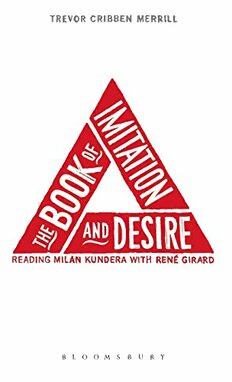
The Book of Imitation and Desire: Reading Milan Kundera with René Girard PDF
Preview The Book of Imitation and Desire: Reading Milan Kundera with René Girard
The Book of Imitation and Desire The Book of Imitation and Desire Reading Milan Kundera with René Girard Trevor Cribben Merrill NEW YORK • LONDON • NEW DELHI • SYDNEY Bloomsbury Academic An imprint of Bloomsbury Publishing Plc 175 Fifth Avenue 50 Bedford Square New York London NY 10010 WC1B 3DP USA UK www.bloomsbury.com First published 2013 © Trevor Cribben Merrill, 2013 All rights reserved. No part of this publication may be reproduced or transmitted in any form or by any means, electronic or mechanical, including photocopying, recording, or any information storage or retrieval system, without prior permission in writing from the publishers. No responsibility for loss caused to any individual or organization acting on or refraining from action as a result of the material in this publication can be accepted by Bloomsbury Academic or the author. Library of Congress Cataloging-in-Publication Data Merrill, Trevor Cribben. The book of imitation and desire : reading Milan Kundera with René Girard / Trevor Cribben Merrill. p. cm. Includes bibliographical references and index. ISBN 978-1-4411-1865-3 (hardcover : alk. paper) 1. Kundera, Milan–Criticism and interpretation. 2. Imitation in literature. 3. Desire in literature. I. Title. PG5039.21.U6Z7786 2013 891.8’635–dc23 2012036722 EISBN: 978-1-4411-9546-3 Typeset by Newgen Imaging Systems Pvt Ltd, Chennai, India It could be said that I am playing at something that Martin lives. Sometimes I have the feeling that the whole of my polygamous life is a consequence of my imitation of other men; although I am not denying that I have taken a liking for this imitation. Milan Kundera, “The Golden Apple of Eternal Desire” Contents Foreword ix Author’s Preface xii 1 “Women Look for Men Who Have Had Beautiful Women” 1 2 Into the Labyrinth of Values 9 The transfiguration of the object 9 Metamorphoses of Kristyna 21 “An imitation of feeling” 26 3 From Imitation to Rivalry 33 The shift from admiration to envy 33 Deceit, desire, and the plight of the aging Don Juan 37 Rivalry and the transfiguration of the object 43 “The younger sister imitated the elder” 48 Publish or perish 56 4 The Model as Obstacle 63 Strategies of revelation 63 The art of polyphonic comparison 68 A little theory of resentment 74 Litost in the underground 77 5 Jealousy and its Metaphors 83 The game gone awry 83 The metaphors of jealousy 89 “A test that gauged her susceptibility to seduction” 94 6 The Quadrille of Desire 105 Sex as theater 105 Acute rivalry and homosexual attraction 116 The geometry of sadomasochism 118 viii Contents 7 At the Heart of the Labyrinth 123 “The thousand-headed dragon” 123 “The cement of their brotherhood” 126 The two temptations 131 “The absolute denial of shit” 134 First time as tragedy, second time as farce 139 8 Repudiating the Model 143 Eduard’s smile 143 From hatred to compassion 148 Karenin’s smile 152 The birth of a novelist 157 Liberating exiles 163 9 Tomas in Colonus, or the Wisdom of the Novel 169 Postscript: A Response to Elif Batuman 175 Appendix: A Brief Overview of Kundera’s Life and Works 183 Notes 189 Bibliography 195 Index 199 Foreword by Andrew McKenna In a letter from prison Dietrich Bonhoffer complains about books “whose productions seem to me to be lacking the hilaritas—cheerfulness—which is to be found in any really great and free intellectual achievement.” This is a startling comment from a man sentenced to death for conspiring against a murderous regime. The conjoining of laughter and moral freedom is worth sounding out, and Trevor Merrill’s deft reading of the novels of Milan Kundera has a lot to teach us about it. The Joke, Laughable Loves, The Book of Laughter and Forgetting: Surely Kundera means us to understand something about humor, which we find is both a theme and a structuring principle of his fictions, its exercise being a way of knowing. To give but a single example: in one of his novels someone tells a joke about a man throwing up on the street in Prague; another man passing by stops to remark, “I know just what you mean.” As if a visceral disgust is pandemic, the all-pervasive response to the grim realities of totalitarian rule; and as if the author’s joke served as a necessary purgative for his indignation. Among the many rewarding concepts that Merrill imparts to us is a definition of the novel as “satire gone wrong,” by which we are meant to understand our best fiction as issuing from a defining correction, something like a conversion, by which an author abandons all pretense to moral privilege. His characters elude the writer’s censure; they are allowed a freedom to emerge in a more fully rounded way than in satire, and are effectively left to their own devices in fashioning the misery they concoct for themselves. The work of desengaño or disillusionment is something the readers have to do on their own. René Girard has written that “all great novels tend to the comic,” and this is the case that Merrill makes for Kundera, who came to admire Girard’s ideas during his exile in Paris. A footnote in his Testaments Betrayed praises Girard’s Deceit, Desire, and the Novel as the best book to read on narrative fiction. This does not mean that Kundera plots his stories according to a grid provided by Girard’s mimetic theory, but that he shares with the French critic the same insights into human interaction. Cervantes is the mentor they have in common as the originator of the modern novel, which is borne aloft by the fundamental intuition that our desires require models, that we desire according to others, and that it is precisely when we ignore or deny this basic reality that we get into the most trouble, with ourselves and with one another.
